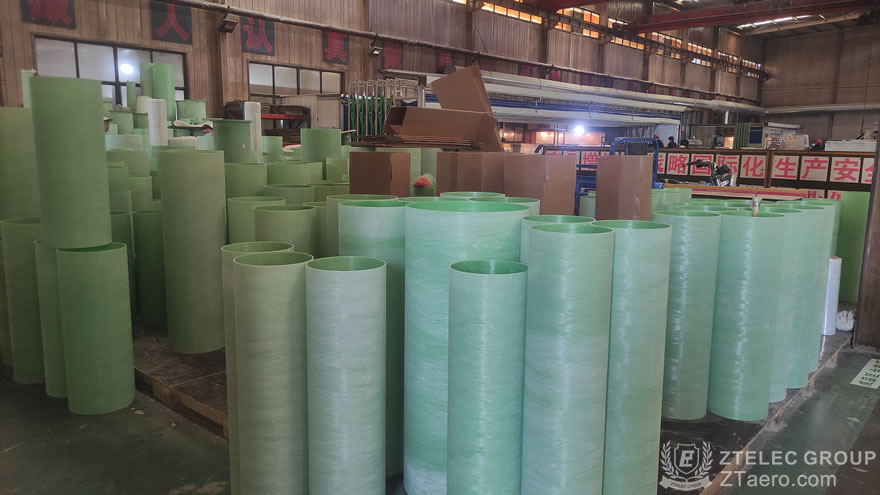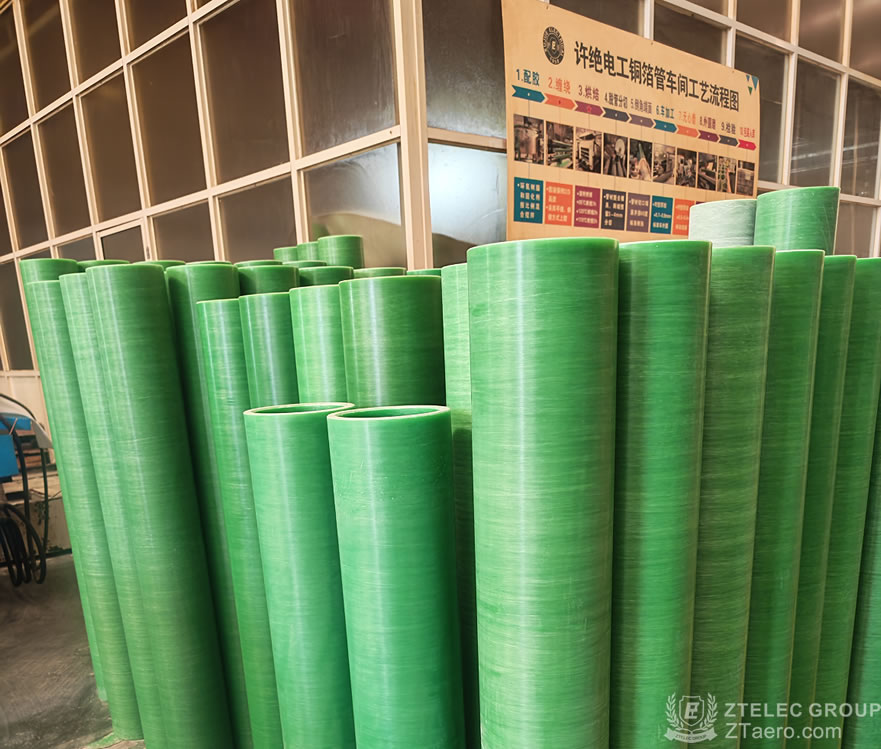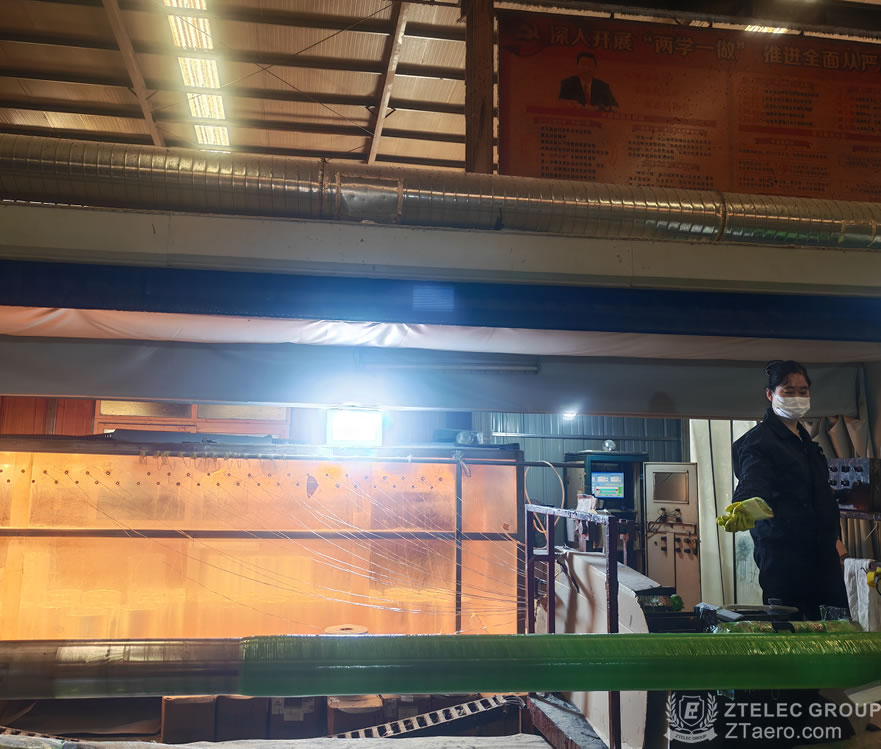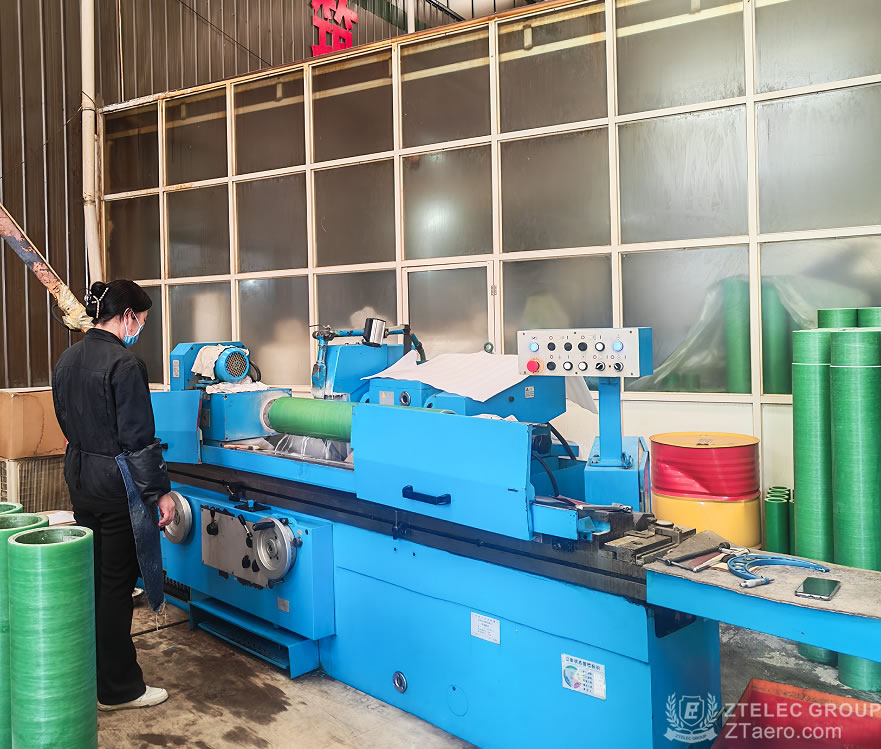Fiberglass Filament Wound Pipe Introduction Fiberglass filament wound pipes (Glass Fiber Reinforced Plastic Winding ...
Fiberglass filament wound pipes (Glass Fiber Reinforced Plastic Winding Pipes, GFRP) are composite pipes made by winding glass fibers (as reinforcement) and thermosetting resins (e.g., epoxy, unsaturated polyester, or vinyl ester) using computer-controlled winding technology. The manufacturing process combines circumferential and helical winding to create a multi-layer composite structure, offering high strength, lightweight properties, corrosion resistance, and excellent electrical performance. The glass fibers provide mechanical strength, while the resin matrix ensures chemical resistance and insulation. With a density only 1/4 that of steel but tensile strength comparable to alloy steel, these pipes require no additional anti-corrosion treatments, making them ideal for harsh environments. They have a design lifespan exceeding 50 years and minimal maintenance costs, serving as a superior alternative to traditional metal pipes.

Fiberglass filament wound pipes are widely used in power systems for protecting and insulating high-voltage cables (110 kV and above). Their non-conductive nature eliminates eddy current losses inherent in metal pipes, preventing cable heating caused by electromagnetic induction. For instance, in urban utility tunnels or underground cable conduits, these pipes resist soil acidity, alkalinity, and groundwater infiltration while providing power-frequency withstand voltages up to 35 kV/mm, ensuring safe cable operation in humid environments. Their smooth inner walls reduce friction during cable installation, and embedded semi-conductive layers can optimize electric field distribution to suppress partial discharges.
In transformers, reactors, and gas-insulated switchgear (GIS), fiberglass wound pipes serve as insulation supports or bushings. For example, epoxy resin-based pipes act as insulation cylinders for transformer windings, enduring long-term temperatures of 155°C and maintaining structural stability under short-circuit current surges, avoiding the brittleness risks of traditional ceramics. In high-voltage switchgear, their high mechanical strength (flexural strength ≥320 MPa) supports heavy conductive components, while flame-retardant properties (oxygen index ≥30%) meet fire safety requirements, reducing the likelihood of arc-induced fires.
In electromagnetically sensitive environments like data centers, communication base stations, and nuclear power plants, fiberglass wound pipes achieve electromagnetic shielding through composite designs. Pipes embedded with copper mesh or carbon fiber layers provide ≥60 dB shielding effectiveness, effectively isolating high-frequency electromagnetic interference (EMI) to ensure stable signal transmission. In nuclear plants, boron-containing glass fiber pipes absorb neutron radiation, safeguarding control cables in high-radiation environments. Their lightweight nature (density 1.8–2.1 g/cm³) makes them ideal for aerial towers or mobile equipment cable routing.
In wind turbine towers, these pipes act as internal cable conduits, resisting salt spray corrosion and high-frequency vibrations with a design lifespan exceeding 25 years. In photovoltaic plants, their UV-resistant properties (enhanced with stabilizers) withstand extreme desert temperatures above 80°C. For rail transit, fiberglass pipes are used in catenary insulation supports, certified to EN 45545 fire safety standards, resisting chemical de-icing agents and maintaining flexibility at -60°C to prevent brittle fractures.
In corrosive industrial settings (e.g., chemical plants, offshore platforms), vinyl ester resin-based pipes resist gases like H₂S and Cl₂, offering cost-effective alternatives to stainless steel. In smart grid infrastructure, they integrate fiber optic channels for “multi-network convergence” of power and communication systems, while IP68-rated sealed joints adapt to wetlands or heavy rainfall. Emerging technologies like self-healing coatings and smart thermal management will further expand their applications in flexible HVDC transmission and superconducting cable protection.




Fiberglass filament wound pipes have become essential in electrical equipment for cable protection, insulation, and electromagnetic shielding. From ultra-high-voltage transmission to renewable energy systems, nuclear plants to smart grids, their applications continue to grow, driving advancements in power system efficiency, reliability, and sustainability. Selection must align with voltage levels, environmental conditions, and industry standards (e.g., IEC 61125, GB/T 1303), with type testing (e.g., long-term durability validation) recommended for critical scenarios.
ZTelec Group is a professional manufacturer of high-quality electrical insulation materials, integrating the research and development, production and sales of electrical and electrical insulation materials. It has more than 65 years of manufacturing experience. The production capacity and market share of insulation materials are ranked top three in the industry, and special insulation materials are ranked first. Products are exported to Europe, America, Southeast Asia and other countries and regions.
If you need to know more about Epoxy Fiberglass Winding Tube / FRP Core Tube For Copper Foil and other insulation materials product information and quotations, please contact us we can mail you samples for your testing
Welcome to visit our factory for guidance.
If you are interested in our products,, please send us a message and we will contact you as soon as we receive it. Email: info@ztaero.com whatsApp: +8616650273778